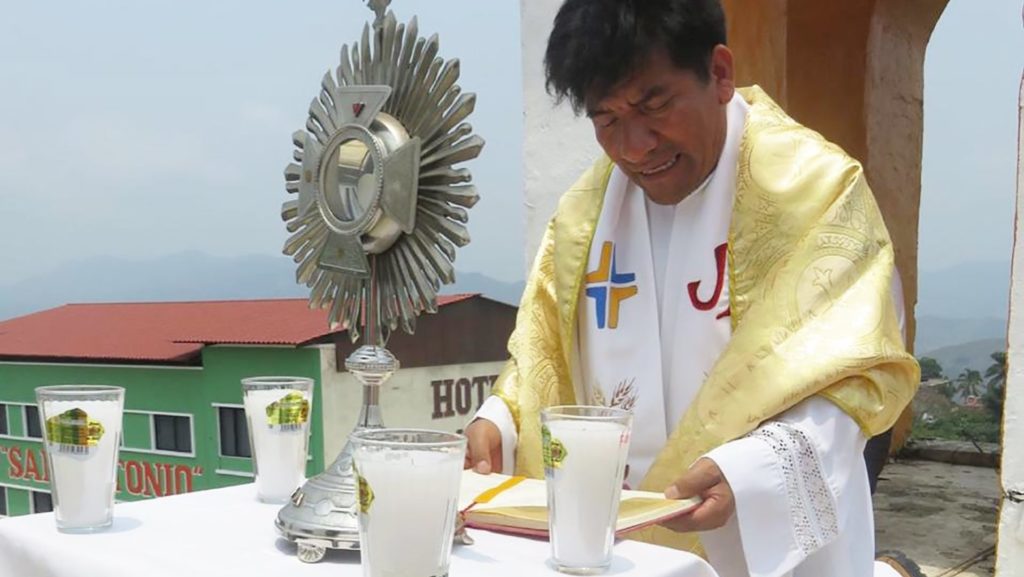An Indigenous Tzotzil priest and peace activist was murdered after celebrating Sunday Mass in Mexico's southern Chiapas state, where the Catholic Church has denounced government inaction in the face of rising violence.
Father Marcelo Pérez, who ministered in Indigenous regions rife with territorial conflicts and later denounced drug cartel violence, was shot dead Oct. 20 by two assailants on a motorcycle as he drove away from the Guadalupe church in San Cristóbal de las Casas, according to Mexican media reports.
The Mexican bishops' conference condemned the murder of Father Pérez, saying in a statement the same day, "This act of violence, perpetrated at the end of Mass when the padre was leaving to continue his pastoral duties, not only deprives the community of a dedicated pastor, but also silences a prophetic voice that tirelessly fought for peace with truth and justice in Chiapas."
The statement continued that Father Pérez was a living example of the priestly commitment to the most needy and vulnerable in society. "His pastoral work, characterized by his closeness to the people and his constant support for those who needed it most, leaves a legacy of love and service that will endure in the hearts of all those whom he touched with his ministry."
Cardinal Felipe Arizmendi Esquivel, retired bishop of San Cristobal de Las Casas, said that Father Pérez "was a priest very focused on his vocation, very prayerful, very close to the tabernacle, and very committed to his people."
Expressing his pain, the cardinal said Father Pérez was one of the first Indigenous priests he ordained as presbyter, he said in an Oct. 20 statement.
"He never got involved in partisan politics, but always fought for the values of the Kingdom of God to be brought to life in the communities," the cardinal said.
The slaying of Father Pérez reinforced Mexico's ruinous reputation as the world's most murderous country for Catholic clergy -- with at least 52 priests murdered since 2006, according to the Catholic Multimedia Center, before Father Pérez was slain. His death comes amid a spate of violence in Chiapas, where drug cartels have disputed territories, forcing villagers to flee -- with hundreds seeking safety in neighboring Guatemala.
"We're now at the mercy of drug cartel conflicts," Jesuit Father Pedro Arriaga told OSV News. He was uncertain of the motive behind Father Pérez's murder, though he said the priest often received threats.
Father Arriaga remembered his close friend as "a very, very dedicated priest," who was "strongly in favor of Ihe indigenous cause. He was beloved. This is going to be a blow to indigenous peoples."
Father Pérez was ordained in 2002 and ministered in several Indigenous communities. He confronted vices tearing communities apart such as alcoholism, while leading protests against human trafficking and resource exploitation, and frequently mediating disputes.
His work in the municipality of Pantelhó led to an arrest warrant being issued for him after state authorities tried linking him to an armed group that rose up against a local strongman, resulting in 21 persons being abducted.
The charges were baseless and he was never detained. Father Pérez was moved shortly thereafter to the Our Lady of Guadalupe parish in the diocesan seat of San Cristobal de las Casa in 2022 due to security concerns.
He continued speaking out against violence in Chiapas, however. The ecclesial province of Tuxtla Gutiérrez convened a Sept. 13 march for peace in the state, where Father Pérez told reporters, "In many communities and municipalities, violence is really unbearable."
"There are many dead, many displaced, many kidnappings, many people are taking refuge in the mountains and that is what is worrying," he said at the march in Chiapas' state capital.
Outgoing Chiapas Gov. Rutilio Escandón condemned the attack on Father Pérez and promised the crime would "not go unpunished." President Claudia Sheinbaum said the case was being investigated.
Former president Andrés Manuel López Obrador, who left office Sept. 30 and whose party dominated Chiapas in the June 2 state and federal elections, previously insisted that reports of violence in the state were exaggerated.
Some in the church called on the government to take Father Pérez's murder as a call to action -- including the Jesuits, who have priests in some of the Chiapas' most conflictive communities.
"We reject any attempt to minimize these acts as isolated cases," the Jesuits' Mexico province said in an Oct. 20 statement. "Organized crime has sowed fear and pain in diverse regions of the country and Chiapas is no exception. The violence in this region reflects a structural problem that demands an urgent and integral response from the State."

